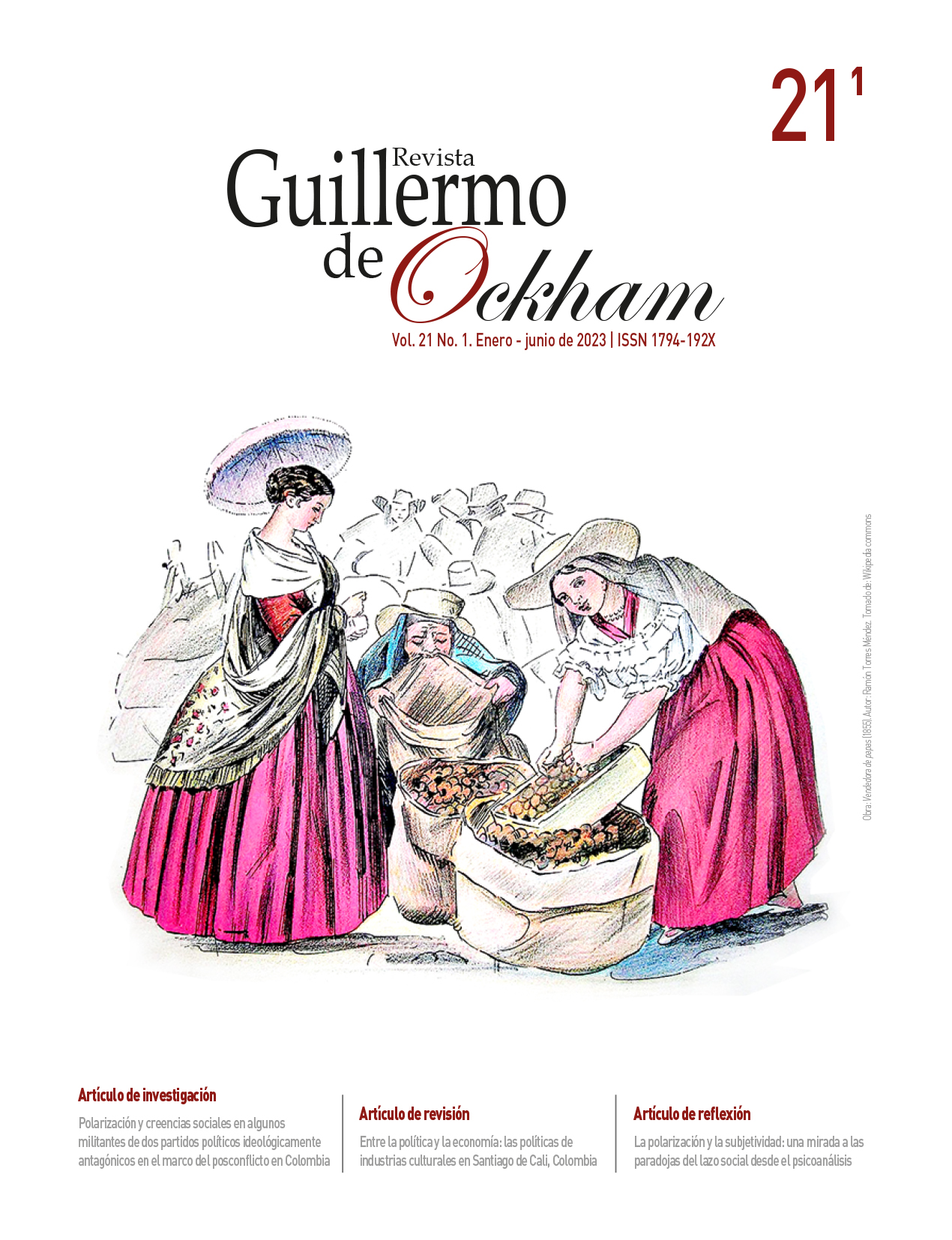The Revista Guillermo de Ockham provides an immediate and open access to its content, based on the principle of offering the public a free access to investigations to provide a global interchange of knowledge.
Unless otherwise established, the contents of this journal has a license with Creative Commons Attribution-NonCommercial-NoDerivatives 4.0 International (CC BY-NC-ND 4.0) http://creativecommons.org/licenses/by-nc-nd/4.0/
- Attribution: You must give appropriate credit, provide a link to the license, and indicate if changes were made. You may do so in any reasonable manner, but not in any way that suggests the licensor endorses you or your use.
- NonCommercial: You may not use the material for commercial purposes.
- NoDerivatives: If you remix, transform, or build upon the material, you may not distribute the modified material.
- No additional restrictions: You may not apply legal terms or technological measures that legally restrict others from doing anything the license permits.
Abstract
The following article of reflection addresses the phenomenon of polarization, a fact that has combined countless scenarios in which language is present as any other cultural event. The contexts that are taken into account as points of discussion, are perceived in the structure of the discourses that have been established at a global level, such as the case of the United States with the concept of Rogue States, as well as the context of the peace agreements in Colombia between the government and the FARC, events that have somehow marked ways of thinking about the social, the ethical and the political perspective from their geopolitical implications in a specific period of history. From there, contributions from philosophy, sociology and journalism are taken into account in order to expand the context of reflection and discussion, going through specific points around the subject of language and discourse as it is proposed from the psychoanalytic theory of Sigmund Freud and Jacques Lacan, in order to provide an explanation about the effects that these processes have on subjectivity. Likewise, it is intended to account for how the subjective constitution implies identification with a discourse, which can be understood as the relationship to the Other. It is concluded that, in polarization, which is understood as a social phenomenon framed in a language structure, significant elements are played that account for certain drive dynamics in various positions of groups and collectives that have demarcated ways of bonding in logical moments of a society and; Likewise, a reflection linked to the ethics of well-saying is established, as a proposal against the elements found in the analysis of the context addressed.
Keywords:
References
Freud, S. (2007a). Pulsiones y destinos de pulsión. En Obras completas (vol. 14, pp. 105-134). Amorrortu Editores.
Freud, S. (2007b). De guerra y muerte: temas de actualidad. En Obras completas (vol. 14, pp. 277-304). Amorrortu Editores.
Freud, S. (2009a). El porvenir de una ilusión. En Obras completas (vol. 21, pp. 1-56). Amorrortu Editores.
Freud, S. (2009b). El malestar en la cultura. En Obras completas (vol. 21, pp. 57-140). Amorrortu Editores.
Freud, S. (2010). Psicología de las masas y análisis del yo. En Obras completas (vol. 18, pp. 63-136). Amorrortu Editores.
Freud, S. (2011). ¿Por qué la guerra? (Einstein y Freud). En Obras completas (vol. 22, pp. 179-198). Amorrortu Editores.
Freud, S. (2012). Obras completas (vol. 8): el chiste y su relación con lo inconsciente. Amorrortu Editores.
Gallo, H. (2012). El psicoanálisis y la investigación en la universidad. Grama Ediciones.
Gómez, C. (2020). El odio como síntoma de lo político. Estudios sobre las Culturas Contemporáneas, 26(52), 223-256. https://www.redalyc.org/articulo.oa?id=31664009017
Gómez-Suárez, A. (2016). El triunfo del no: la paradoja emocional detrás del plebiscito. Icono.
Han, B. C. (2016). Topología de la violencia. Herder.
Lacan, J. (1988). El seminario (libro 7): la ética del psicoanálisis. Paidós.
Lacan, J. (2006). El seminario (libro 1): los escritos técnicos de Freud. Paidós.
Lacan, J. (2010). La agresividad en psicoanálisis. En Escritos 1 (pp. 94-116). Siglo XXI.
Lacan, J. (2012). El seminario (libro 20): aún. Paidós.
Lacan, J. (2013). El seminario (libro 17): el reverso del psicoanálisis. Paidós.
Lacan, J. (2014). El seminario (libro 6): el deseo y su interpretación. Paidós.
Lara, P. (2018). Adiós a la guerra: una historia breve de los conflictos en Colombia. Planeta.
Ramírez, M. E. (2010). Actualidad de La agresividad en psicoanálisis de Jacques Lacan. Grama Ediciones.
Soler, C. (2016). La hipótesis lacaniana. En Incidencias políticas del psicoanálisis (vol. 1, pp. ). S&P Ediciones.
Soler, C. (2020). Retorno a la “función de la palabra”. Colegio Clínico de París. Curso 2018-2019. Escabel.
Spinoza, B. (2012). Ética: demostrada según el orden geométrico. Agebe.
Yepes, L. A. (2008). Defensoría del lector en tres periódicos colombianos, 1992-2007. Editorial Universidad de Antioquia.

































